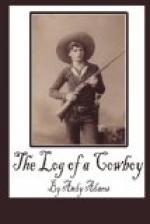Only once did I come near betraying my trust. About the middle of the third day I grew very hungry, and as the cattle were lying down, I crept to the edge of the canebrake to see if my dinner was not forthcoming. Soldiers were in sight, which explained everything. Concealed in the rank cane I stood and watched them. Suddenly a squad of five or six turned a point of the brake and rode within fifty feet of me. I stood like a stone statue, my concealment being perfect. After they had passed, I took a step forward, the better to watch them as they rode away, when the grass dropped out of the bell and it clattered. A red-whiskered soldier heard the tinkle, and wheeling his horse, rode back. I grasped the clapper and lay flat on the ground, my heart beating like a trip-hammer. He rode within twenty feet of me, peering into the thicket of cane, and not seeing anything unusual, turned and galloped away after his companions. Then the lesson, taught me by my mother, of being “faithful over a few things,” flashed through my mind, and though our cattle were spared to us, I felt very guilty.
Another vivid recollection of those boyhood days in Georgia was the return of my father from the army. The news of Lee’s surrender had reached us, and all of us watched for his coming. Though he was long delayed, when at last he did come riding home on a swallow-marked brown mule, he was a conquering hero to us children. We had never owned a horse, and he assured us that the animal was his own, and by turns set us on the tired mule’s back. He explained to mother and us children how, though he was an infantryman, he came into possession of the animal. Now, however, with my mature years and knowledge of brands, I regret to state that the mule had not been condemned and was in the “U.S.” brand. A story which Priest, “The Rebel,” once told me throws some light on the matter; he asserted that all good soldiers would steal. “Can you take the city of St. Louis?” was asked of General Price. “I don’t know as I can take it,” replied the general to his consulting superiors, “but if you will give me Louisiana troops, I’ll agree to steal it.”
Though my father had lost nothing by the war, he was impatient to go to a new country. Many of his former comrades were going to Texas, and, as our worldly possessions were movable, to Texas we started. Our four oxen were yoked to the wagon, in which our few household effects were loaded and in which mother and the smaller children rode, and with the cows, dogs, and elder boys bringing up the rear, our caravan started, my father riding the mule and driving the oxen. It was an entire summer’s trip, full of incident, privation, and hardship. The stock fared well, but several times we were compelled to halt and secure work in order to supply our limited larder. Through certain sections, however, fish and game were abundant. I remember the enthusiasm we all felt when we reached the Sabine River, and for the first time viewed the promised land. It was at a ferry, and the sluggish river was deep. When my father informed the ferryman that he had no money with which to pay the ferriage, the latter turned on him remarking, sarcastically: “What, no money? My dear sir, it certainly can’t make much difference to a man which side of the river he’s on, when he has no money.”




